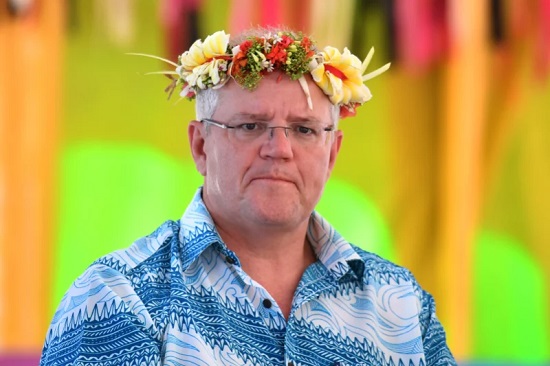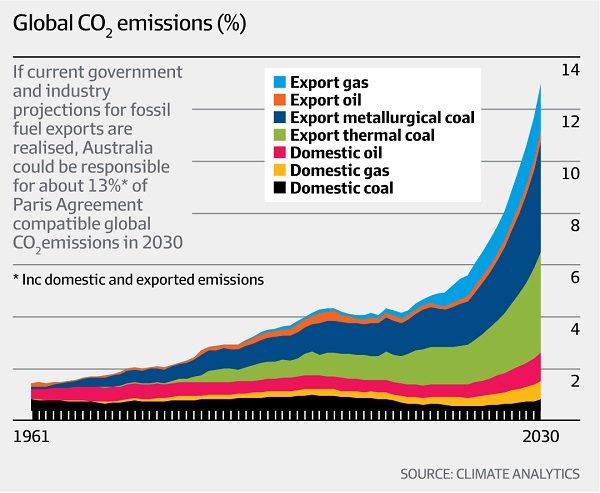
In the Pacific Island Forum (PIF) climate change is seen as an existential threat. ‘Existential’ in the sense that life for the Pacific islanders is embedded in community and place. Shifting to higher ground somewhere else is not a solution. (See Geoff Henderson’s excellent guest post Climate refugees in the Central Pacific -the Republic of Kiribati)
To put the best construction on what happened, Pacific leaders and Australia agreed to disagree about action on climate change.
PIF chair, Tuvalu’s Prime Minister Enele Sopoaga, said to Australian PM Scott Morrison:
- “You are concerned about saving your economy in Australia … I am concerned about saving my people in Tuvalu.”
The Pacific Small Island Developing States group had met before the main meeting, formulating the Tuvalu Declaration:
- “We re-affirm the UN secretary-general’s call for an immediate global ban on the construction of new coal-fired power plants and coal mines and … [call on them to] rapidly phase out their use of coal in the power sector.”
To accommodate Australia, the PIF Kainaki II Declaration read:
- “Invite all parties to the Paris Agreement to reflect” on the UN secretary-general’s remarks on “fossil fuel subsidies and just transition from fossil fuels”.
Sopoaga says “we were exchanging flaring language”. It went on for 12 hours, and Tonga’s Prime Minister Akilisi Pohiva had been reduced to tears.
This was already a PR and foreign relations disaster for the Morrison government. Oxfam Australia Climate Change Policy Adviser Simon Bradshaw is right when he:
- warned that Australia was now playing a very dangerous game in the region.
“We cannot remain a member of the Pacific family if we continue to undermine our neighbour’s futures through our climate recklessness,” Dr Bradshaw said. “A strong family looks after all its members, especially its most vulnerable. It does not risk their futures.”
Dr Bradshaw said this year’s Pacific Islands Forum came at a time when great powers from China to the United Kingdom were stepping up their engagement with the region. He said Vanuatu was lined up to host next year’s Pacific Islands Forum, with Fiji proposing to host the following year – two powerful members who would be working hard to hold Australia accountable.
“The Morrison Government may consider today’s outcome a win. But it is a Pyrrhic victory that sets us down a very dangerous path,” Dr Bradshaw said.
The disaster was made worse when Nationals leader and Deputy PM Michael McCormack said the Pacific islands will survive the climate crisis because they ‘pick our fruit’.
For background, Australia last September signed the Boe Declaration highlighting climate change as “the single greatest threat” to Pacific people, although back then newly minted foreign minister Marise Payne was also wrangling over the language.
Morrison says he is accountable to the Australian people.
In truth on this one he is being held to climate denying views of the Coalsheviks in his own party, and in his coalition partners, the Nationals. Malcolm Turnbull explained to Jonathon Green on ABC RN Drive what it was like. He outlined the nature of the existential threat of climate to the Pacific countries, the strategic importance of Australia’s involvement with the Pacific, which warranted the Pacific Step Up Plan he launched in 2016, and he roundly condemned Alan Jones for his misogyny in saying Morrison should put a sock in Jacinda Adern’s mouth.
As did everyone. On ABC Insiders Lenore Taylor and others related how we see the same sequence over and over. There is pressure from advertisers on Macquarie Broadcasting, Jones is pulled into line, but after time the advertisers come back only to find the cycle repeats. This time he may be on a last chance. Maybe.
Along the way Michael O’Keefe, Head of politics and philosophy at La Trobe University, said:
- Australia’s stance on climate change has become untenable in the Pacific. The inability to meet Pacific Island expectations will erode Australia’s influence and leadership credentials in the region, and provide opportunities for other countries to grow influence in the region.
For example, China.
Nicky Ison of the Institute for Sustainable Futures at the University of Technology, Sydney, says at The Guardian in Scott Morrison’s Betrayal Of The Pacific Was Immoral – And Completely Unnecessary:
- China is actively working to strengthen its position in the Pacific, seeing this as a strategic location. Their efforts include backing the calls by Pacific leaders to act on climate and phase-out coal power, as well as direct support for infrastructure and renewable energy deployment in the Pacific. As a country that has globally committed to climate leadership, China has both the moral authority and the economic leverage to make Australia increasingly irrelevant. Scott Morison’s performance at the Pacific Island Forum has not helped this situation.
Australia’s regional and global influence will not grow unless we are fair dinkum about acting on climate change. Without greater domestic action, we may be able to throw our weight around at the Pacific Islands Forum, but we will slowly lose our geopolitical, economic and moral authority in a world that has committed to act on the climate crisis.
See also:
Victoria Stead – Picking fruit is work, not benevolence, and doesn’t absolve Australia of climate responsibility
Professor Martina Linnenluecke – China and Japan see the future, and it’s not coal: why Australia will be stranded
- SMH editorial – Australia has lost Pacific’s trust on climate change
- China’s special envoy to the Pacific, Wang Xuefeng, addressed the forum’s leaders on Friday and described their demands as “legitimate”.
So it was interesting that NZ Foreign Minister Winston Peters reminded everyone that:
- China’s high emissions also had to be part of the conversation.
“You need to look at everybody, not just Australia, but also who is getting that coal and what things they are doing with it,” Peters said.
There has been a tendency to say that those who mine and sell the coal (and gas) should take some responsibility for what they do.
An AFR article on BHP’s praiseworthy move to assist its customers of its mining operations in limiting emissions showed this graph from Climate Analytics:

Jonathon Green on ABC RN Drive put the moral question to Pat Conroy, Shadow Minister for International Development and the Pacific, Shadow Assistant Minister for Climate Change in an interview last Tuesday. Conroy was steadfast in saying that our responsibility was to reduce our own emissions in the first instance. As was Penny Wong. Get our own house in order first. If the rest of the world does the same, we won’t have a fossil fuel export industry to worry about.
From the Nicky Ison article in language ScoMo should understand:
- Australia’s regional and global influence will not grow unless we are fair dinkum about acting on climate change.
Climate Analytics purpose in drawing up these graphs was not to change the way emissions are accounted for internationally. Rather it was to highlight risk.
The urgency of the climate crisis is rapidly coming to a point where new fossil fuel mines will need to become stranded assets before their economic life has run its course. The graph above is frightening.
I’ll take this issue up in another post, but meanwhile the SMH editorial is right:
- the government should have a long-term plan to phase out domestic-coal fired power stations and prepare mining communities for a transition away from coal.

Australia could shut down all its emissions tomorrow without having any significant effect on when some Pacific nations become unlivable because of rising sea level. To have any chance at all countries like China and the US would have to shut down all of their emissions at the same time and even then it is doubtful that this would make the critical difference.
Morrison was a disaster at the forum because he was his usual smartarse self and showed the Pacific Islanders no more empathy than he shows for poor Australians.
He should have talked about actions to make critical islands less vulnerable t sea level rise and moving people to Australia when people have to leave their homelands..
John, I’ve just started reading Niki Savva’s book about how Morrison came to power. She says he is given to shouting at people at times, did it to Matthias Cormann a couple of times after he was made treasurer. Cormann told him straight to his face to cut it out, that he wouldn’t be spoken to like that, and that appears to have worked – for Cormann.
From accounts it appears that he returned to his shouting form with the Pacific Islanders. Kate Lyon at The Guardian says:
Penny Wong said that Labor in government could not have agreed to turn off the tap immediately with coal either. The Oz found that a bit exciting.
Albo said coal would be part of the energy mix “for a time”, obviously choosing his words carefully.
I heard the Tuvalu leader say today that they got more out of Morrison than they really expected. He crossed out “coal” and put in “fossil fuel”. Signed up to aim at 1.5°C etc, etc.
I think they essentially put in an ambit claim, then played hard-ball. ScoMo may have underestimated them.